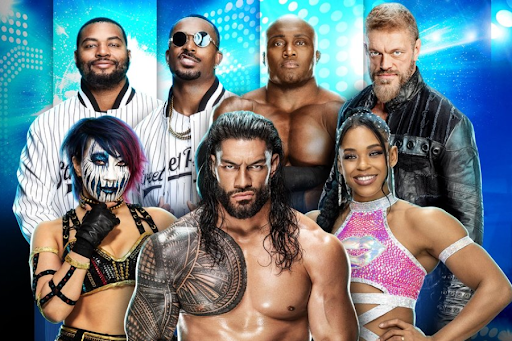The wrestling world thrives on anticipation, drama, and unexpected twists—and this week delivered all three. WWE reportedly changed matches after Smackdown in Orlando, throwing fans and performers alike into a whirlwind of speculation and concern. The event, initially scheduled to deliver some major story developments and confrontations, took an unforeseen turn in the wake of public health concerns—specifically COVID-19 protocols.
As live audiences returned to arenas post-pandemic, the promise of seeing superstars like Roman Reigns, Cody Rhodes, Bianca Belair, and others perform live became an emotional high for many. Yet, with the persistent shadow of COVID-19 and its emerging variants, WWE had to make fast, difficult decisions—proving once again that safety, not spectacle, takes precedence when lives are on the line.
A Sudden Twist in the Tale: The Reason Behind the Shift
WWE reportedly changed matches after Smackdown in Orlando due to concerns over COVID-19 outbreaks and potential exposure. With the emergence of new variants and the threat of infection still looming, the company had to make crucial last-minute adjustments to safeguard its talent, crew, and live audience.
According to inside sources, WWE received updates on potential COVID-related risks just hours after the event concluded. This prompted a reevaluation of scheduled matches, especially those involving close physical contact or travel between states. WWE’s medical and production teams collaborated to assess the potential risks, resulting in the immediate reshuffling of the post-Smackdown lineup.The health of the WWE Universe—both in and outside the ring—is a top priority. The quick decisions reflect a growing trend across the entertainment industry to remain vigilant and proactive in the face of ongoing health concerns.
Behind the Curtain: Which Matches Were Affected?
Though official match listings weren’t publicly released before the Orlando event, insiders confirm that at least three major matchups were either canceled, postponed, or revised. Among the most anticipated was a rumored title bout featuring one of Smackdown’s top superstars. However, WWE reportedly changed matches after Smackdown in Orlando, pulling the match from the schedule entirely.
Another major change involved a high-profile tag team bout that would have progressed an ongoing feud. That match, too, was cut without immediate explanation, sending fans buzzing across social media platforms.In a bold move, WWE inserted some fresh matchups in place of the canceled ones, allowing rising stars an unexpected spotlight. While not part of the original storyline, these substitutes added surprise value, albeit with a mixed reception from fans.
Wrestlers React: Adapting to Rapid Changes
For WWE superstars, sudden match changes are nothing new—but the reasons behind them matter. In this case, many performers voiced support for the changes, acknowledging that health and well-being should always come first. That said, some were visibly disappointed as they had spent weeks preparing for these moments—both physically and mentally.
WWE reportedly changed matches after Smackdown in Orlando. forcing some wrestlers to stay off the card despite traveling and training intensively. Others had to pivot on short notice, performing in matches they hadn’t originally prepared for. This dynamic environment demands a high level of professionalism and adaptability—traits the WWE roster has consistently demonstrated.One wrestler, who chose to remain anonymous, told a source backstage: “It’s frustrating, of course, but we understand. The last thing anyone wants is to cause an outbreak. We’re entertainers, but we’re also human beings with families to protect.”
Fan Experience Disrupted: Mixed Reactions From the WWE Universe
For fans, WWE reportedly changed matches after Smackdown in Orlando. left many disheartened. Those who attended the event or tuned in online were expecting specific story developments and matchups based on teasers and promos aired in prior weeks. The unexpected card reshuffle meant some dream confrontations were postponed or removed altogether.
Social media quickly lit up with speculation and disappointment. Hashtags like #SmackdownOrlando and #WWEChanges trended for hours, with reactions ranging from understanding to outright frustration. However, a large number of fans expressed support, recognizing that safety should override performance in uncertain times.Still, the lack of immediate communication from WWE left a communication gap. Fans expect transparency, especially when match changes affect ticket value, travel plans, or storyline progression.
WWE’s Official Response: A Commitment to Health and Safety
WWE eventually addressed the changes with a brief statement emphasizing their dedication to maintaining a safe environment for performers, staff, and fans. Without revealing specific match details, they confirmed that the adjustments were made following updated health guidance and internal testing protocols.WWE reportedly changed matches after Smackdown in Orlando. but made clear that such decisions, although disruptive, are made with the greater good in mind. The organization acknowledged the inconvenience but thanked fans for their continued support and understanding.
Talent relations officers were quick to reinforce the message internally as well, offering guidance and support to wrestlers impacted by the decisions. Performers were assured that rescheduled match opportunities would be provided and that storyline plans would be adjusted to reflect the latest changes.
Entertainment in a Pandemic Era: The New Norm
A worldwide pandemic has forced the entertainment sector—including professional wrestling—to remake itself. WWE reportedly changed matches after Smackdown in Orlando. a move reflective of broader shifts seen across live performances, sports events, and media productions.
From enhanced sanitation backstage to regular COVID testing and modified fan interactions, the evolution has been fast and necessary. The introduction of ‘Thunderdome’-style virtual fan attendance during the lockdown era was just one of WWE’s many innovative responses.Now, as live events resume in full swing, the company walks a tightrope between delivering unforgettable entertainment and upholding strict health measures.
Future Events: What to Expect Moving Forward
So what does this mean for upcoming WWE events? Fans should prepare for more dynamic, fluid programming. With health risks still present, WWE is likely to continue its reactive strategy—altering match cards as needed based on health and safety updates.
WWE reportedly changed matches after Smackdown in Orlando, setting a precedent for future events. We may see increased medical screenings, fewer cross-brand appearances, and contingency plans built into every event schedule. Creative teams are reportedly working overtime to draft alternate scripts and storylines that can adapt on the fly.Additionally, the company may limit audience capacity in certain cities or revise travel policies for superstars, especially when new variants emerge.
The Balancing Act: Safety Versus Showmanship
Wrestling is an intricate blend of athleticism and theatrical storytelling. When WWE reportedly changed matches after Smackdown in Orlando, they reminded us that even the most scripted spectacle must bow to real-world concerns.
Balancing the need for safety with the desire to put on a high-energy show is challenging—but essential. WWE’s ability to adapt and still deliver strong content, even in the face of adversity, is a testament to its resilience.As fans, we must recognize that our favorite moments sometimes come at a cost—whether physical, mental, or logistical. Supporting these changes means supporting the health and livelihood of the people who bring these stories to life.
Long-Term Impact on Storylines and Superstars
One of the biggest questions fans have is how these sudden changes will impact ongoing storylines. In wrestling, continuity is king. A missed match can derail a months-long feud or character arc. However, WWE’s creative team is known for turning even real-life disruptions into compelling storylines.
Because WWE reportedly changed matches after Smackdown in Orlando, some rivalries may take unexpected turns—or be extended beyond their originally intended arcs. For newer talent, this could also open doors. Unexpected airtime and surprise matchups often give rising stars the platform to impress fans and management alike.While some may view this as a setback, others see opportunity. Adversity in WWE often leads to innovation, and this may be another case where limitations give rise to creativity.
FAQs:
Q1: Why did WWE reportedly change matches after Smackdown in Orlando?
A: The changes were primarily due to COVID-19 concerns, including potential exposure among talent and crew. WWE acted quickly to ensure the safety of everyone involved.
Q2: Were any major title matches canceled?
A: Reports suggest at least one high-profile title match was pulled from the schedule, though WWE has not publicly confirmed which.
Q3: How did fans react to the changes?
A: Fan reactions were mixed—some were disappointed, while many understood the importance of safety and praised WWE for being proactive.
Q4: Will WWE continue making last-minute changes?
A: Yes, WWE has indicated that it will continue monitoring public health updates and may alter match cards as needed to protect talent and fans.
Q5: How are wrestlers affected by such last-minute changes?
A: Wrestlers often have to adjust their routines, travel plans, and mental preparation. However, most have expressed support for prioritizing safety.
Q6: What precautions is WWE taking moving forward?
A: WWE is enhancing health protocols, which may include more frequent testing, altered travel plans, and contingency scripts for major shows.
Q7: How does this affect the long-term storylines in WWE?
A: While disruptions can impact storytelling, WWE’s creative team is adept at reworking narratives to accommodate real-world events.
Conclusion:
In conclusion, WWE reportedly changed matches after Smackdown in Orlando, highlighting the ongoing challenges of hosting live events during unpredictable times. The move reflects WWE’s commitment to safety, even when it means reshaping carefully laid plans. Though the changes brought disappointment for some, they also reaffirm the company’s core values—adaptability, responsibility, and resilience.
As fans, it’s important to support not just the spectacle, but also the people behind it. Wrestling may be scripted, but real-life challenges like health and safety are not. By staying flexible and informed, both fans and performers can continue to enjoy the magic of WWE—even when the script gets flipped.
Keep an eye for more latest news & updates on Touch Cric!

